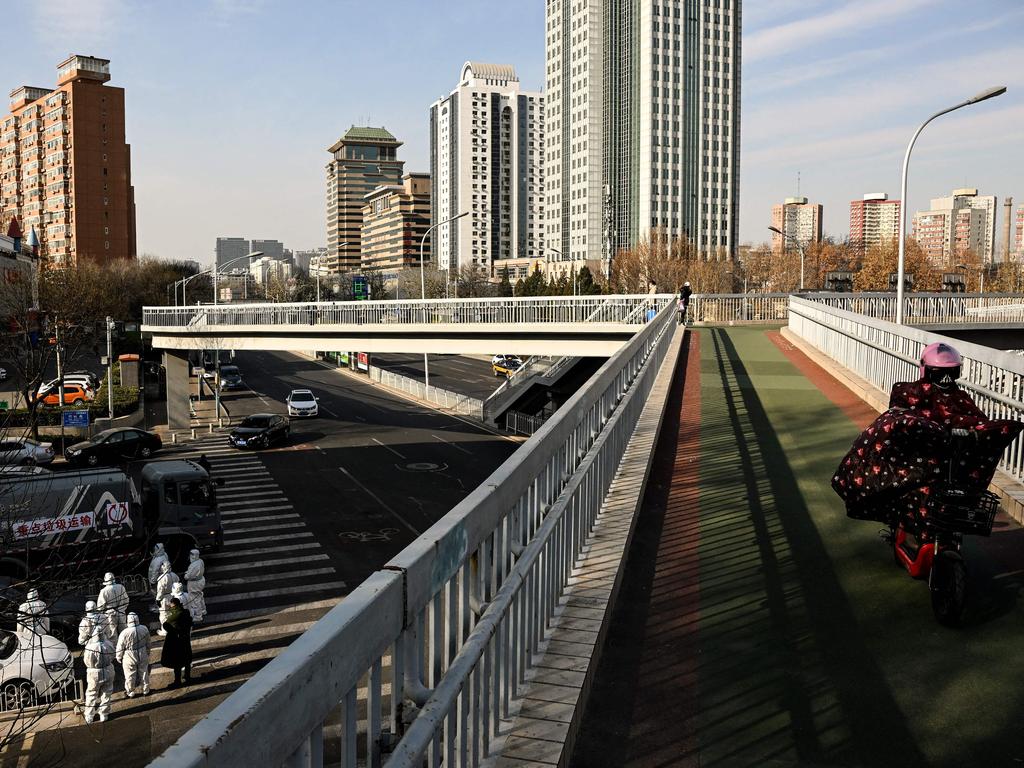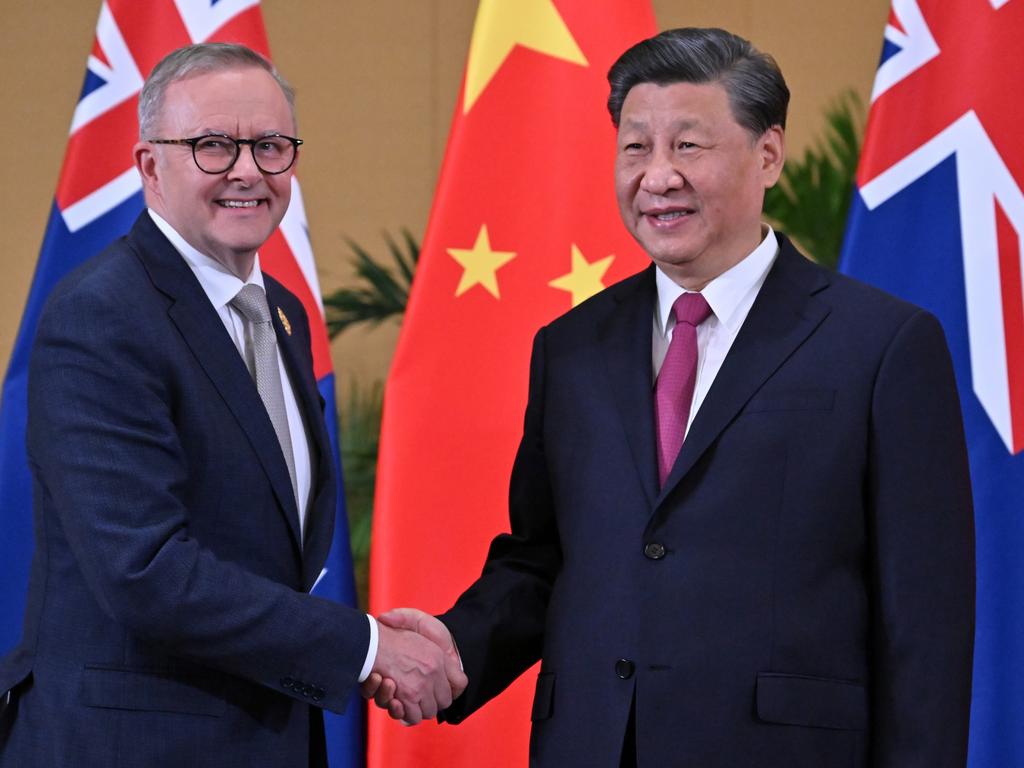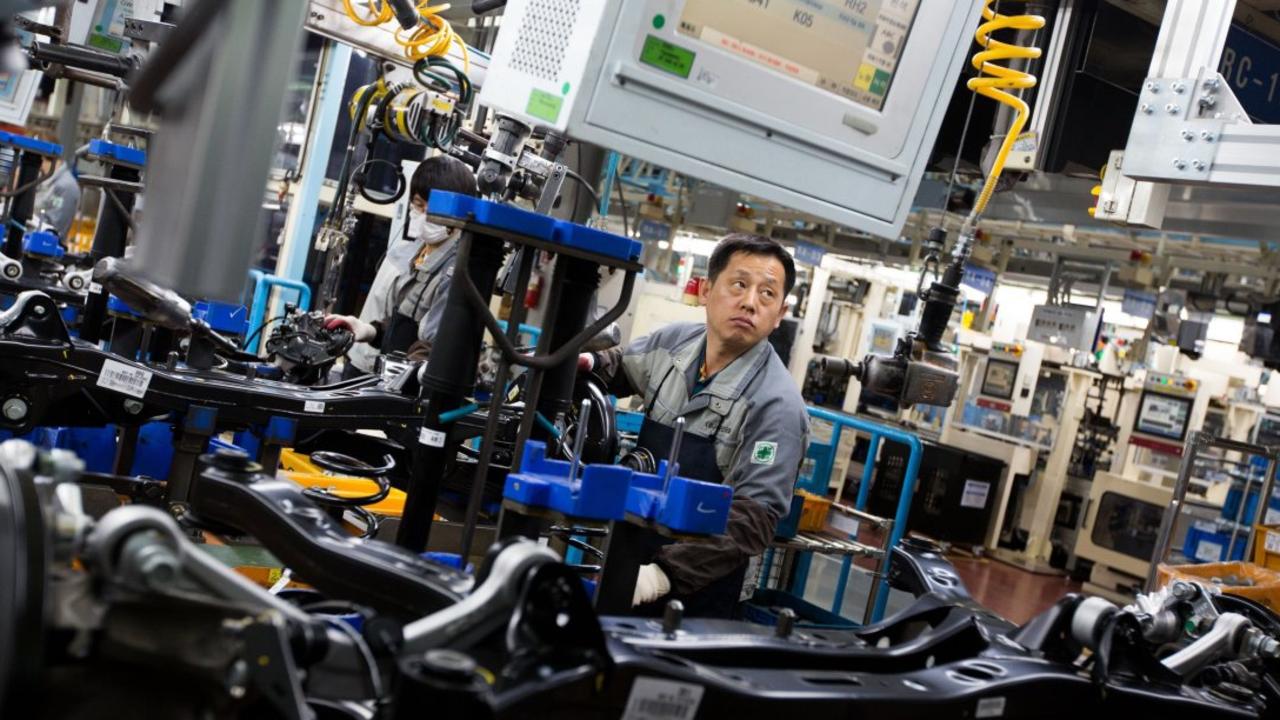Australia still firmly on China’s ‘blacklist’ despite apparent relaxation
China has called it a “win-win” but really it could just be seen as a win for Australia. There are reasons to be cautious though.
Everything’s a “win-win” situation – if Australia “rights its wrongs”. That’s why there’s little evidence China’s trade war with Australia is about to end.
An “important window” has opened up in the China-Australia economic and trade relationship, a Chinese Ministry of Commerce spokeswoman told a regular press conference in Beijing on Thursday.
“It is entirely possible to find mutually beneficial and win-win solutions through dialogue and communication,” Shu Jueting explained.
Relations between the two countries collapsed early in 2020 when Australia called for an independent international investigation into the origins of the Covid-19 pandemic. Beijing immediately retaliated with a campaign of economic coercion.
Barley, beef, coal, copper, cotton, lobster, nickel and wine exports were choked.
But, almost three years later, most of these Australian industries have found new markets. And it’s China’s economy that is struggling.

Now Beijing is shifting the tone of its rhetoric.
New hope of easing tensions arose when Prime Minister Albanese and Chairman Xi met in November last year. And ministerial-level trade discussions recommenced even as a shipment of Australian coal was allowed into a Chinese port.
But, according to China analyst Dr Jianli Yang, even the two leaders meeting at the G20 summit set the tone for what is to come.
“Chinese leader Xi Jinping wants everyone to believe that his meeting with Australian Prime Minister Anthony Albanese last November came about because Australia — not China — has changed,” Dr Yang argues in The Diplomat.
“Xi will never admit that he is the one who capitulated after a failed Two-and-a-half-year strategy to make an example of Australia by cutting off ties and imposing trade sanctions.”

Words versus actions
“Perhaps the slowdown in the Chinese economy may have led Xi Jinping to think that he needs a bit of a breathing space to focus on some of his domestic problems,” leading international China analyst Bonnie Glaser told the Australian Strategic Policy Institute (ASPI). “But I don’t think that this is in any way a strategic readjustment in China’s relationship with the world and its foreign policy. I think it is rather tactical.”
Beijing certainly appears to be sending mixed messages.
“Both sides have been working assiduously to seek solutions to differences and disputes between the two countries, in particular with relation to trade, and to bring about a reset of the bilateral relations,” says the president of the Chinese Association of Australian Studies Chen Hong. “A sanguine and vigorous relationship not only contributes to the economic and social development of the two countries, but is also conducive to the stability and prosperity of the Asia-Pacific region, and of the world.”
China-Australia trade ties in "important window" and both sides should work together to inject more positive factors into economic & trade cooperation: Chinese Commerce Ministry https://t.co/sAJFTGgx7ppic.twitter.com/IKrWO0LXCR
— Global Times (@globaltimesnews) February 16, 2023
But such upbeat rhetoric is yet to be demonstrated in deeds.
“The only products China is buying from Australia are things that it absolutely needs and aren’t readily available elsewhere,” Dr Yang argues.
Mostly that means iron ore and natural gas.
“For virtually everything else — from grain to timber, from seafood to wine, and even services — Australia remains firmly on China’s trade blacklist,” she adds. “Even the much-heralded return of Australian coal to Chinese buyers a few months ago is more symbolic than anything else. Shipments are a fraction of what they were three years ago.”
Beneath the velvet glove
China “supports Australia to play a strategically more important role on the international arena”, Chen states in the Communist Party controlled Global Times.
But he quickly changes tone.
“China resolutely opposes the US’ recent attempts to enlist countries, including Australia, to form exclusive groupings and cliques with the purported aim to impair and deter China’s peaceful development.”
The Chinese academic then dismisses two years of Australia’s lived experience.
“China takes no interest in influencing and interfering with any other country’s internal affairs, never seeking to alter their political, economic and social affairs,” he writes. “China, in turn, expects reciprocal respect of its national independence, and recognition of differences in the governance systems, values and cultures.”
Wang Yi, a member of the Political Bureau of the CPC Central Committee, on Thu hailed establishment of the preparatory office of the intl organization for mediation. Wang said China has always been a builder of world peace, a defender of intl order & a provider of public goods. pic.twitter.com/il9XOIdlYZ
— Global Times (@globaltimesnews) February 16, 2023
This reinforces the underlying points of conflict between Australia and Beijing.
In November 2021, Beijing issued a dossier of 14 grievances against Canberra and the Australian people. It insisted they must be addressed before relations could improve.
“China is angry. If you make China the enemy, China will be the enemy,” an Australia-based Chinese diplomat declared at the time.
Things didn’t turn out the way Beijing expected.
“Over two years of trade restrictions have failed to bring Australia to heel,” says Dr Yang. “Instead, the Chinese Communist Party (CCP) has been forced to live with an increasingly critical Australia.”
Glaser, however, believes there is little indication that Beijing has shifted its stance: “Whether or not China will actually begin to lift these restrictions on Australia, I think, remains a question mark.”
Contest of wills
“China has recognised that Australia is willing to stand up for its interests and its principles, that it can’t be intimidated and bullied, like other countries were,” Glaser says. “But of course, the Chinese will never admit they were wrong. But maybe we are at a turning point in how they are going to deal with Australia”.
Beijing had cause to believe it would succeed.
South Korea is often pointed to as a victory for Beijing’s “Wolf Warrior” diplomacy.
In 2017, Washington moved to help protect Seoul from North Korea’s missile threats by installing an advanced THAAD radar and interceptor system. Beijing was outraged.
“They want other countries to show deference to China to put China’s interests first,” Glaser says. “And countries that do not protect Chinese interests and make their own decisions based on their interests often get punished.”

South Korea suddenly saw a collapse in Chinese tourists, and its pop stars disappeared from Chinese media. Hyundai car sales plunged, consumer goods exports were blocked, and fire regulations were used to shut down a South Korean supermarket chain.
After nine months, Seoul capitulated.
“The Moon government undertook not to expand the THAAD system, not to enter a missile-defence network with the US, and not to enter any trilateral alliance with the US and Japan,” says ASPI senior fellow David Uren. “It was a humiliating deal for Korea, and China withdrew its boycotts in return.”
Beijing saw little reason to believe Canberra would be any different.
“I think Australia looked at what other countries experienced and drew very important lessons from that,” Glaser explains. “And so it’s taken the Chinese some time to understand that Australia is not quite the country that they thought it was.”
Xi’s “own goal”
“Beijing’s campaign against Australia looks increasingly like an own goal, pushing Australia into closer alliance with the US, as evident in both AUKUS and the Quad arrangement, without achieving any obvious gains,” says Uren.
But Beijing’s economy has this year taken a turn for the worse.
Vice Premier Liu He told the World Economic Forum in Davos that ‘opening up to the world is a must, not an expediency’ for China.
But Chinese Commerce Minister Wang Wentao went on to tell Australia’s minister of state Don Farrell not to expect Beijing to compromise on “principled” issues.
But the pressure is on Beijing.
It has applied to join the Comprehensive and Progressive Agreement for trans-Pacific Partnership. It hopes to capitalise upon any free trade agreement for the Pacific region.
Acceptance, however, requires the agreement of all existing participants.
Suddenly, Beijing needs Canberra on side.
“These are ultimately decisions which always end up at the ministerial level,” trade minister Dan Tehan said last year. “There’s never been a free-trade agreement that’s purely been negotiated at an officials level.”
Beijing reinstated ministerial-level talks in January.
“Recently, relations between Beijing and Canberra have been less combative, but the Albanese government remains rightly wary of China’s ambitions,” Dr Yang says.
“It is high time for a values-based economic equivalent to NATO to keep China in check. It is the best response to the CCP’s own decades-long strategy of maintaining a “united front” with its allies and dividing and conquering its opponents.”
Jamie Seidel is a freelance writer | @JamieSeidel






